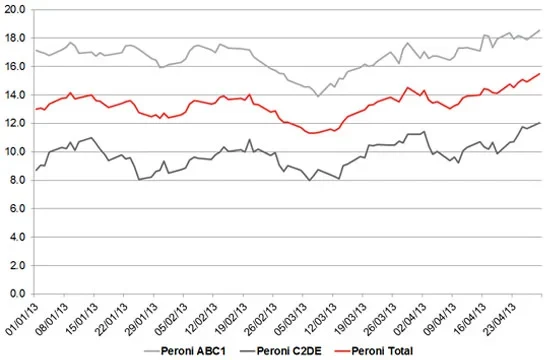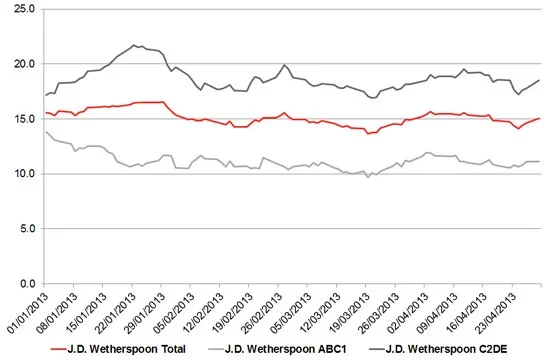YouGov CEO, Stephan Shakespeare, asks whether Pernoi’s recent actions will benefit its branding as a “posh pint” or if this might be seen as class snobbery.
Miller Brands caused a stir last week when it emerged that the firm had refused to allow Peroni to be served in the Crown Hotel in Skegness because the town “didn’t fit the brand”.
With pub chain JD Wetherspoon also not allowed to sell the Italian beer on tap, I’ve used BrandIndex to see how successful Miller has been at positioning the beer as an upmarket tipple.
Publican perception
Looking first at Peroni, we can see that as of Monday they have a reasonable BrandIndex Index score; on a scale of minus 100 to plus 100 that measures image, their score is plus 16.
However, there is a sharp and clear divide when we look at that by social grade.
The brand has a score of plus 19 among ABC1s, the traditional middle class consumers. Compare that to the plus 12 that it scores with C2DEs (working class consumers) and we can see that it is definitely held in higher regard in the more upmarket group.

We don’t track Skegness on BrandIndex, but we can look at Wetherspoons. We see what is almost a mirror image of Peroni’s consumer perception: on Monday it had an overall Index score of plus 15 and that breaks down as plus 11 among ABC1s and plus 19 with C2DEs.

A tale of two brews
That divide can be further illustrated by looking at the individual measures that make up the Index score. On value, Peroni scores plus five compared to Wetherspoons’ plus 32, while on quality Peroni is at plus 21 and Wetherspoons is far behind at plus two.
So we can see that there is method behind Peroni’s decision – it is an upmarket brand that appeals to smart set consumers, and to safeguard this image it takes steps to disassociate itself from more downmarket ones.
The open question is whether Peroni will benefit from branding itself as a “posh pint”, or will it be harmed by what might be seen as class snobbery.






